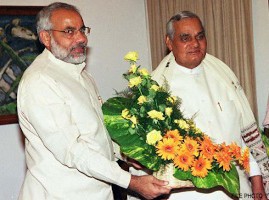Narendra Modi
Narendra Modi is the 14th and current Prime Minister of India, having taken office on May 26, 2014. Born on September 17, 1950, in Vadnagar, a small town in northeastern Gujarat, Modi is a member of the Bharatiya Janata Party (BJP) and the Rashtriya Swayamsevak Sangh (RSS), a Hindu nationalist volunteer organization.
Early Life and Education[edit | edit source]
Narendra Modi was born into a lower-middle-class family of grocers. He completed his secondary education in Vadnagar and showed an early interest in politics during his adolescence. Modi left home at the age of 18 and traveled across India, visiting a number of religious centers. He returned to Gujarat and moved to Ahmedabad in the late 1960s, where he became a full-time worker for the RSS. Modi later pursued a degree in political science from Delhi University through a distance education program and obtained a Master of Arts degree from the University of Gujarat.
Political Career[edit | edit source]
Modi's political career began in the early 1970s when he became involved with the RSS. By the late 1980s, Modi had risen within the ranks of the RSS and was appointed as the General Secretary of the BJP's Gujarat unit. He played a significant role in strengthening the party in Gujarat, leading to the BJP's victory in the 1995 state assembly elections.
In 2001, Modi was appointed as the Chief Minister of Gujarat following the resignation of his predecessor, Keshubhai Patel, due to poor health and allegations of mismanagement of the state. Modi's tenure as Chief Minister was marked by significant economic growth for the state but also faced criticism for his administration's handling of the 2002 Gujarat riots. Despite the controversies, Modi was re-elected as Chief Minister in 2002, 2007, and 2012.
In 2013, Narendra Modi was declared the BJP's candidate for Prime Minister ahead of the 2014 general elections. Under his leadership, the BJP won a historic mandate, securing a majority in the Lok Sabha, the first time a single party had done so in three decades. Modi's campaign focused on promises of economic growth, development, and good governance.
Prime Ministership[edit | edit source]
Since taking office, Modi has initiated several major policies and programs, including the Make in India initiative to boost manufacturing, the Swachh Bharat Abhiyan (Clean India campaign) to improve sanitation and public health, and the Digital India campaign to improve online infrastructure and digital literacy. His government has also implemented the Goods and Services Tax (GST), one of the most significant tax reforms in the country's history.
Modi's foreign policy has been characterized by efforts to improve relations with neighboring countries, as well as major global powers. He has actively engaged in high-profile diplomatic visits and hosted several world leaders in India.
However, his administration has faced criticism on various fronts, including allegations of undermining democratic institutions and promoting a Hindu nationalist agenda. The handling of the COVID-19 pandemic in India and the implementation of the Citizenship Amendment Act (CAA) have sparked significant controversy and protests.
Personal Life[edit | edit source]
Narendra Modi is known for his ascetic lifestyle and is a vegetarian. He has authored several books, including "Jyotipunj," which highlights the lives of RSS leaders. Modi is also known for his use of social media to communicate with the public.
Legacy and Criticism[edit | edit source]
Modi's tenure as Prime Minister has been marked by significant economic initiatives and a push towards digitalization. However, his leadership has also been divisive, with supporters lauding his efforts to transform India's economy and stature on the global stage, while critics accuse him of authoritarian tendencies and promoting social divisions.
Navigation: Wellness - Encyclopedia - Health topics - Disease Index - Drugs - World Directory - Gray's Anatomy - Keto diet - Recipes
Search WikiMD
Ad.Tired of being Overweight? Try W8MD's physician weight loss program.
Semaglutide (Ozempic / Wegovy and Tirzepatide (Mounjaro) available.
Advertise on WikiMD
WikiMD is not a substitute for professional medical advice. See full disclaimer.
Credits:Most images are courtesy of Wikimedia commons, and templates Wikipedia, licensed under CC BY SA or similar.
Contributors: Prab R. Tumpati, MD





